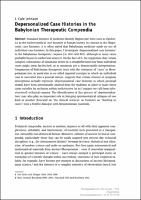Chapter Depersonalized Case Histories in the Babylonian Therapeutic Compendia
| dc.contributor.author | Cale Johnson, J. | |
| dc.date.accessioned | 2019-11-13 23:55 | |
| dc.date.accessioned | 2020-01-07 16:47:06 | |
| dc.date.accessioned | 2020-04-01T09:29:45Z | |
| dc.date.available | 2020-04-01T09:29:45Z | |
| dc.date.issued | 2015 | |
| dc.identifier | 1006325 | |
| dc.identifier | OCN: 1135847674 | en_US |
| dc.identifier.uri | http://library.oapen.org/handle/20.500.12657/23813 | |
| dc.description.abstract | Standard histories of medicine identify Hippocratic texts such as Epidemics as the earliest medical case histories in human history. In contrast to the Hippocratic case histories, it is often stated that Babylonian medicine made no use of individual case histories. In this paper, I investigate ‘depersonalized case histories’ in the Babylonian therapeutic corpora (ca. 800–600 BCE, although in many cases probably based on earlier lost sources). On the face of it, the suggestion that certain complex collocations of symptoms derive in a straightforward way from individual cases might seem far-fetched, or at minimum not a demonstrable interpretation. Comparison of Babylonian therapeutic texts with the treatment of ‘cases’ in Mesopotamian law, in particular in so-called imperial rescripts in which an individual case is converted into a general statute, suggests that certain clusters of symptom descriptions actually represent ‘depersonalized’ case histories in which personal details have been intentionally omitted from the tradition in order to make these cases suitable for inclusion within authoritative(or as I suggest we call them infrastructural) technical corpora. The identification of this process of ‘depersonalization’ may also play an important role in bringing epistemological critiques of one kind or another (Foucault on ‘the clinical sciences’ or Forrester on ‘thinking incases’) into a fruitful dialogue with Mesopotamian materials. | |
| dc.language | English | |
| dc.subject.classification | thema EDItEUR::N History and Archaeology::NH History::NHG Middle Eastern history | en_US |
| dc.subject.classification | thema EDItEUR::Q Philosophy and Religion::QR Religion and beliefs::QRM Christianity | en_US |
| dc.subject.classification | thema EDItEUR::Q Philosophy and Religion::QR Religion and beliefs::QRR Other religions and spiritual beliefs::QRRT Indigenous, ethnic and folk religions and spiritual beliefs::QRRT1 Indigenous religions, spiritual beliefs and mythologies of the Americas | en_US |
| dc.subject.other | early scientific thought | |
| dc.subject.other | compilation and redaction in the ancient world | |
| dc.subject.other | infrastructural compendia | |
| dc.subject.other | empiricism | |
| dc.title | Chapter Depersonalized Case Histories in the Babylonian Therapeutic Compendia | |
| dc.type | chapter | |
| oapen.identifier.doi | 10.1515/9781501502507-012 | |
| oapen.relation.isPublishedBy | 2b386f62-fc18-4108-bcf1-ade3ed4cf2f3 | |
| oapen.relation.isPartOfBook | c92480a7-ce87-4e4b-9a17-0de50ff2d484 | |
| oapen.relation.isFundedBy | 7292b17b-f01a-4016-94d3-d7fb5ef9fb79 | |
| oapen.relation.isbn | 9781501510762; 9781501502521 | |
| oapen.collection | European Research Council (ERC) | |
| oapen.place.publication | Berlin/Boston | |
| oapen.grant.number | 323596 | |
| oapen.grant.acronym | BabMed | |
| oapen.identifier.ocn | 1135847674 |

